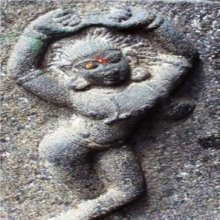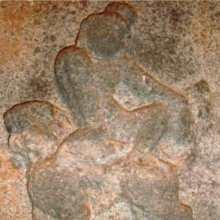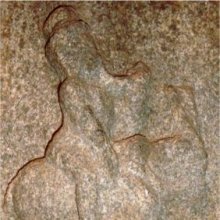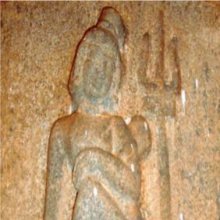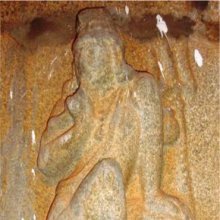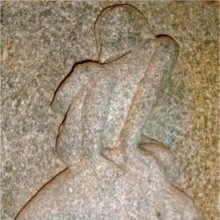Natha, Nātha: 26 definitions
Introduction:
Natha means something in Buddhism, Pali, Hinduism, Sanskrit, Jainism, Prakrit, the history of ancient India, Marathi, Hindi. If you want to know the exact meaning, history, etymology or English translation of this term then check out the descriptions on this page. Add your comment or reference to a book if you want to contribute to this summary article.
Natha has 25 English definitions available.
Images (photo gallery)
(+65 more images available)
Languages of India and abroad
Sanskrit dictionary
[Deutsch Wörterbuch]
Source: Cologne Digital Sanskrit Dictionaries: Böhtlingk and Roth Grosses Petersburger WörterbuchNātha (नाथ):—(von nāth)
1) n. Zuflucht, Hülfe [Atharvavedasaṃhitā 4, 20, 9.] viśve de.ā mama nā.haṃ bhavantu [9, 2, 7. 18, 1, 13.] pra.āpati.upādhāvannā.hami.chamānaḥ [Taittirīyabrāhmaṇa 1, 6, 4, 1.] —
2) m. a) Schutzherr, Beschützer, Gebieter, Herrscher [Hemacandra’s Abhidhānacintāmaṇi 359.] [Mahābhārata 2, 2292. 6, 1554. 16, 137.] senā tvayā nāthena pālitā [Rāmāyaṇa 1, 77, 3.] [Pañcatantra 82, 19.] [Bhāgavatapurāṇa 1, 11, 6.] pāṇḍavānāṃ bhavānnāthaḥ [Mahābhārata 2, 776.] sa me nātho hyanāthasya bhava [Rāmāyaṇa 1, 62, 7.] yatra rāmo bhayaṃ tatra nāsti tatra parābhavaḥ . sa hi nātho sya jagataḥ [2, 48, 14. 3, 10, 10.] nāthaṃ patagalokasya [3, 73, 36.] oṣadhīnām (candra) [Raghuvaṃśa 2, 73.] [Kathāsaritsāgara 21, 144.] payasām (samudra) [Pañcatantra V, 90.] kula [Mahābhārata 2, 2609.] ikṣvāku [Rāmāyaṇa 1, 6, 19.] trailokya [76, 19.] [Raghuvaṃśa 3, 45.] [Kumārasaṃbhava 1, 59.] [Bhāgavatapurāṇa 2, 6, 43. 4, 2, 16.] dvirāśināthā ṛtavaḥ [Sūryasiddhānta 14, 10.] pāṇḍya [Varāhamihira’s Bṛhajjātaka S. 11, 61. 56.] [Geschichte des Vidūṣaka 193.] [Daśakumāracarita] in [Benfey’ Chrestomathie aus Sanskritwerken 201, 6.] jīvita vom Gatten [Spr. 447.] Auch ohne weiteren Beisatz vom Gemahl [Raghuvaṃśa 12, 75.] insbes. im voc. [Nalopākhyāna 11, 3. 12, 15.] [Amaruśataka 53.] [Geschichte des Vidūṣaka 139.] Am Ende eines adj. comp.: parjanyanāthāḥ paśavaḥ das Vieh hat Parjanya (den Regen) zum Schutzherrn, hängt ganz von ihm ab [Mahābhārata 5, 1131.] mṛtanāthāmiva striyam [16, 136.] gṛhaṃ nārīnātham im Besitz oder bewohnt von [Mṛcchakaṭikā 59, 3.] = sanātha versehen mit: madhyaṃ striyāstrivalinātham [Varāhamihira’s Bṛhajjātaka S. 68, 5.] — b) Nomen proprium eines Autors [Weber’s Verzeichniss No. 647.] [Oxforder Handschriften 113,a. 126,a.] — c) das durch die Nase gezogene Seil beim Zugochsen (vgl. nāthahari) [Wilson’s Wörterbuch] — Vgl. a, ku, govinda, jagannātha, dhunī, nara, sa, su u. s. w.
--- OR ---
Nātha (नाथ):—
2) a) Besitzer [Spr. 5417.]
Source: Cologne Digital Sanskrit Dictionaries: Sanskrit-Wörterbuch in kürzerer FassungNātha (नाथ):——
1) n. Zuflucht , Hülfe. —
2) m. — a) Schutzherr , Beschützer , Gebieter , Herrscher , Besitzer von Etwas (Gen.) Häufig vom Gatten , insbes. im Voc. Am Ende eines adj. Comp. (f. ā) auch so v.a. im Besitz seiend — , eingenommen von , versehen mit. — b) *das durch die Nase gezogene Seil beim Ochsen. — c) Nomen proprium eines Autors.
Sanskrit, also spelled संस्कृतम् (saṃskṛtam), is an ancient language of India commonly seen as the grandmother of the Indo-European language family (even English!). Closely allied with Prakrit and Pali, Sanskrit is more exhaustive in both grammar and terms and has the most extensive collection of literature in the world, greatly surpassing its sister-languages Greek and Latin.
See also (Relevant definitions)
Starts with (+87): Na-talai-mativili, Na-tankipecu, Na-tankivay, Nata-nirvari, Nata-rupatarai, Natacaram, Natacayam, Natacuram, Natakitam, Natakkattu, Natakkiyai, Natakkumil, Natakkutam, Natalvar, Natam, Natan, Natanamakkiriyai, Natantam, Natanu, Nataputta.
Ends with (+532): Abhinandananatha, Acalanatha, Adharanatha, Adhilokanatha, Adhinatha, Adinatha, Adrinatha, Advayanandanatha, Adyanatha, Ahonatha, Ajitanatha, Alabdhanatha, Alalanatha, Alinatha, Allalanatha, Amaranatha, Amardakatirthanatha, Ambaranatha, Ambunatha, Amitanatha.
Full-text (+1272): Goraksha, Prananatha, Nishithininatha, Nagarjuna, Raghunatha, Nirnatha, Adinatha, Vinatha, Nakanatha, Yadunatha, Kshapanatha, Dharmanatha, Gonatha, Dhuninatha, Bhutanatha, Lokanatha, Nathavat, Bhairavanathatantra, Nathahara, Nathani.
Relevant text
Search found 80 books and stories containing Natha, Nātha, Nāṭha; (plurals include: Nathas, Nāthas, Nāṭhas). You can also click to the full overview containing English textual excerpts. Below are direct links for the most relevant articles:
Lakulisha-Pashupata (Philosophy and Practice) (by Geetika Kaw Kher)
Goraksanatha and Natha Sampradaya < [Chapter 2 - Spread and Transition]
Kapalikas and Natha Siddhas < [Chapter 2 - Spread and Transition]
Samkaracarya and Kapalikas < [Chapter 2 - Spread and Transition]
Brihad Bhagavatamrita (commentary) (by Śrī Śrīmad Bhaktivedānta Nārāyana Gosvāmī Mahārāja)
Verse 2.4.64-65 < [Chapter 4 - Vaikuṇṭha (the spiritual world)]
Verse 2.4.9 < [Chapter 4 - Vaikuṇṭha (the spiritual world)]
Verse 2.4.163 < [Chapter 4 - Vaikuṇṭha (the spiritual world)]
Garga Samhita (English) (by Danavir Goswami)
Verse 3.7.33 < [Chapter 7 - The Holy Places of Śrī Girirāja]
Verse 1.16.23 < [Chapter 16 - Description of Śrī Rādhikā’s Wedding]
Verse 3.7.37 < [Chapter 7 - The Holy Places of Śrī Girirāja]
Dhammapada (Illustrated) (by Ven. Weagoda Sarada Maha Thero)
Verse 160 - The Story of the Mother of Kumārakassapa < [Chapter 12 - Atta Vagga (Self)]
Verse 379-380 - The Story of Venerable Naṅgala Kula (Attachment to Old Clothes) < [Chapter 25 - Bhikkhu Vagga (The Monk)]
Verse 318-319 - The Story of the Disciples of Non-Buddhist Teachers < [Chapter 22 - Niraya Vagga (Hell)]
Vasudevavijaya of Vasudeva (Study) (by Sajitha. A)
Kāraka (h): The Genitive (sixth) Case < [Chapter 3 - Vāsudevavijaya—A Grammatical Study]
Taddhita (in Sanskrit grammar) < [Chapter 3 - Vāsudevavijaya—A Grammatical Study]
Poetic charm in Vāsudevavijaya < [Chapter 4 - Vāsudevavijaya—A Literary Appreciation]
Rasa Jala Nidhi, vol 5: Treatment of various afflictions (by Bhudeb Mookerjee)
Part 8 - Chemists of the Metallic School: King Rama Chandra < [A Brief History of Indian Chemistry and Medicine]
Part 20 - Chemists of the Metallic School: Nitya-natha < [A Brief History of Indian Chemistry and Medicine]
Chapter 26 - Symptoms and treatment of Amavata (gout and rheumatism)
Related products
